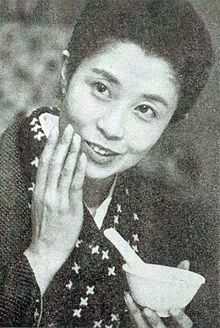
Kyoko Koizumi is a Japanese singer and actress. She is signed to Victor Entertainment.
Tomoko Tabata is a Japanese actress. She won the best supporting actress award from the Mainichi in 2004 for The Hidden Blade and Blood and Bones, and the best actress award at the Mainichi Film Awards for The Cowards Who Looked to the Sky in 2012.

Medals of Honor are medals awarded by the Emperor of Japan. They are awarded to individuals who have done meritorious deeds and also to those who have achieved excellence in their field of work. The Medals of Honor were established on December 7, 1881, and were first awarded the following year. Several expansions and amendments have been made since then. The medal design for all six types are the same, bearing the stylized characters 褒章 on a gilt central disc surrounded by a silver ring of cherry blossoms on the obverse; only the colors of the ribbon differ.
Ayumi Ishida is a Japanese actress and singer. Her real name is Yoshiko Ishida. She is the second among four daughters. She won the award for Best Actress at the 4th Yokohama Film Festival for Yajūdeka. She also won the awards for best actress at the 29th Blue Ribbon Awards and the 11th Hochi Film Award for House on Fire and Tokei - Adieu l'hiver.
Repast is a 1951 Japanese drama and shomin-geki film directed by Mikio Naruse and starring Setsuko Hara. It is based on the final and unfinished novel by Fumiko Hayashi, and was the first in a series of adaptations of her work by the director.
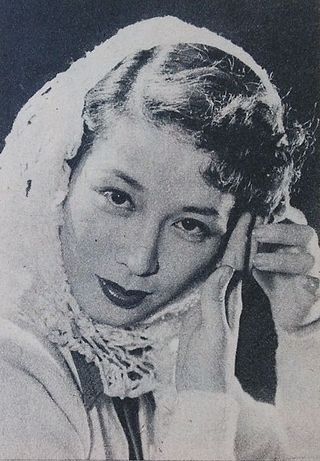
Chikage Awashima was a Japanese film and stage actress.
Keiko Matsuzaka is a Japanese actress.

Haruko Sugimura was a Japanese stage and film actress, best known for her appearances in the films of Yasujirō Ozu and Mikio Naruse from the late 1940s to the early 1960s.
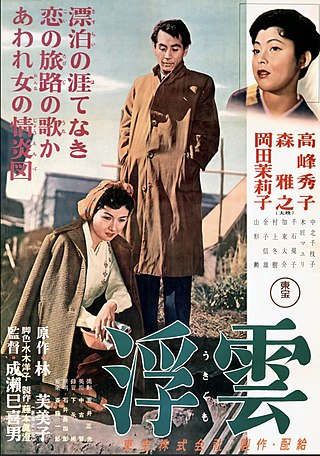
Floating Clouds is a 1955 Japanese drama film directed by Mikio Naruse. It is based on the novel of the same name by Japanese writer Fumiko Hayashi, published just before her death in 1951. The film received numerous national awards upon its release and remains one of director Naruse's most acclaimed works.

Isuzu Yamada was a Japanese stage and screen actress whose career spanned seven decades.

Person of Cultural Merit is an official Japanese recognition and honour which is awarded annually to select people who have made outstanding cultural contributions. This distinction is intended to play a role as a part of a system of support measures for the promotion of creative activities in Japan. By 1999, 576 people had been selected as Persons of Cultural Merit.
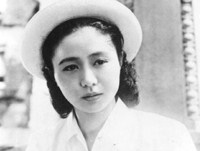
Nobuko Otowa was a Japanese actress who appeared in more than 100 films between 1950 and 1994.
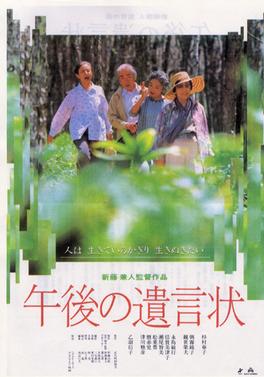
A Last Note is a 1995 Japanese comedy-drama film directed by Kaneto Shindo. It was the last film of actresses Haruko Sugimura and Nobuko Otowa.

Lightning is a 1952 Japanese drama film directed by Mikio Naruse. It is based on the 1936 novel by Fumiko Hayashi and was the second in a series of adaptations of Hayashi's work by Naruse after the 1951 Repast.

Tokyo Lullaby (東京夜曲) is a 1997 Japanese film directed by Jun Ichikawa.

Sachiko Hidari was a Japanese actress and film director.

Shioli Kutsuna is an Australian-born Japanese actress, known for her role as Ran Mori in Shinichi Kudo's Written Challenge!, Minami Maho in Beck, Haru/Harumi in 125 Years Memory, and Yukio in Deadpool 2. She plays Mitsuki in the Apple TV+ series Invasion (2021). In 2014, she won the Japan Academy Film Prize for Newcomer of the Year.
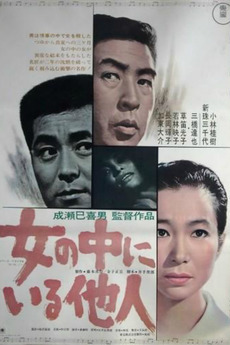
The Stranger Within a Womana.k.a.The Thin Line is a 1966 Japanese drama film directed by Mikio Naruse. It is based on the 1951 novel The Thin Line by Edward Atiyah.
Makiko Mori(森 万紀子, December 19, 1934 – before November 17, 1992) was a Japanese novelist. She won the 1980 Izumi Kyōka Prize for Literature for her book Yuki Onna (雪女).
A Cat, Shozo, and Two Women, also titled Shozo, a Cat, and Two Women, is a 1956 Japanese comedy film directed by Shirō Toyoda. It is based on Jun'ichirō Tanizaki's 1936 novella A Cat, a Man, and Two Women.
